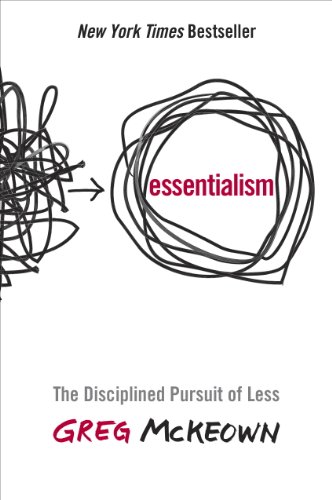If you’re wondering if you are working too much, you probably are. And you’re not alone in thinking that work is becoming dangerously all consuming. It’s said that the perfect blend of productivity, efficiency, and happiness is roughly around 40 hours of work per week.
But once you start pulling all-nighters, working in the range of 50 to 60 hours per week on a constant basis, it’s time to draw the line. That’s just the first sign of overworking.
Today, we’re bringing you 5 clear signs you work too much (and what to do instead). Let’s get started!

Essentialism
by Greg McKeown
⏱ 15 minutes reading time
🎧 Audio version available
When You’re Not Taking Proper Care of Yourself
You know when you’re working too much is when your body starts sending warning signals. It’s never good to forego the very things that keep you healthy, happy, and energized, such as sleep and exercise, in order to do something work-related.
These signs can make themselves known in the form of trouble sleeping, bouts of anxiety and mood swings, and constantly feeling groggy.
Here is what to do instead. We’re going to start right now with a breathing exercise. Breathe in. Count to three. Exhale. Count to Six. Make sure to your exhales are longer and slower than your inhales. You’re calming your mind, resetting that extra nervous nervous system. And now, it’s time to tackle the bigger issues.
One of the most common signs of overworking your body is a lack of adequate sleep. Start thinking of sleep as non-negotiable. Set rules for yourself. No work email after a certain hour. Create a go-to-bed routine that makes it easier to fall asleep, such as taking a nice, hot shower and doing light stretching before bed. Make your bed comfy, have a cup of calming tea, and set the alarm for six to eight hours of quality sleep.
And you know what? Waking up well-rested is going to make a huge difference in your next workday because you’re going to absolutely power through it! No more daytime fatigue. Your mind is quiet at bedtime, you’re no longer grumpy, and your productivity will shoot through the roof!
Poor sleep is awful for so many reasons. Not only does it lead to the daytime fatigue we just mentioned, but it can affect your health on a long-term basis. You’re dramatically increasing your risk for many diseases such as chronic conditions, type 2 diabetes, and heart disease.
The “Hero” Syndrome
Do you often find yourself taking on too much, fixing others’ work, and constantly stressing about whether or not what you’re doing is perfect? Is it unfathomable to even consider asking others for help? And lastly, no matter how tired you are, no matter how many weekends and free time you just gave up, do you find yourself being proud of being the one to save the day?
This isn’t just perfectionism. It’s something called the “Hero syndrome” and it’s a red flag waving, blaring sirens sign that you’re working way too much.
This may be affecting not just you, but others. Lacking the ability to be collaborative, to delegate, and let others make mistakes, and more importantly, learn will affect the entire workplace.
Start being honest with yourself about how much you’re taking on that’s unnecessary, and start practicing the fine art of letting go. Allow others to help. Ask for help. And if you find an opportunity to, share with your superiors that the workload is too much. It’s liberating.
Tell them that at the end of the day, your work hours have gotten out of control. You’re close to burning out or already have, and you’re not as efficient as you were. Bring up all your accomplishments and how much you’ve contributed to the company if you need. Just don’t forget that no job should make you sick.
When Free Time is a Foreign Concept
It goes like this: your job is so time-consuming that you have little spare time. After a few months, or even years, of this, you start forgetting about the last time you went on vacation, went on an adventure, or did an activity without staying “logged in” to your work and email. When was the last time you watched a fascinating movie, went shopping, or allowed yourself to do something that’s– gasp!– totally unproductive?
If you identify with “you can take someone out of the office, but you can’t take the office out of them”; you need to rethink your priorities.
When you’re working, feel free to focus on work, but it’s not good to take work home with you. If your mind and body are constantly in work mode, you’re going to get exhausted. Constantly and consistently taking work home, obsessively going over reports, presentations, and projects at times when you don’t necessarily need to– that’s going to catch up with you later.
Now let’s say you actually got a day off, or even a few hours…and you find yourself lost. This is a sign that you’re not just working too much, it’s that work has taken over your life to the point it doesn’t allow for anything else.
In this spare time, you think: “What do I do now? Do I watch a movie? Do I go on a walk? Do I…and you find yourself unable to decide, overwhelmed with options. Eventually, this may lead to working even more, because you don’t consider other possibilities.
So, what should you do? Consider building non-work into your week. Take that schedule, to-do list, or whatever system you use to organize your tasks, and give yourself permission to add small stuff like “listen to music”, “exercise”, “read a book” “watch an episode of that show you keep hearing about.”
Add “hang out with friends” as a must-do at least once a week. Because– let’s be honest– at this point, your personal relationships must be taking a hit. You’re spending so much time at the office that you’re spending a significantly less amount of time with loved ones.
You’re probably missing events, gatherings, and so many dinners that you’re drifting further away from the people you care about and who care about you.
All Your Dreams Are Work-Related
Of course, it’s important to have career goals and to have high aspirations, but they can’t be all you think about. You can, and should, have dreams that aren’t related to making money and advancing your career. There is no limit to what your personal aspirations can be.
There are family aspirations, dreams related to your interests, travel, et cetera– not everything about the future should be related to promotions, raises, gaining the admiration of your boss, landing projects, and so on.
Another way to tell you’re working too much? When someone innocently asks you what your dreams for the future are, you answer something that’s work-related. That should be a red flag to yourself. Because it means that all your interests are now bound within the confines of your job.
So, what should you do instead? If work is taking over your dreams, it’s time to revisit what made you happy before your job consumed you, before work defined your decisions, and before you start to grow concerned about how much of yourself you’ve been giving to your job.
What were your hobbies before? Did you have Pinterest boards of activities you wanted to do? Did you enjoy often hanging out with friends and family? If you’re not interested in the same things anymore, find new dreams to pursue!
Your Health Is Suffering
And finally, we have the ultimate sign that you’re working too much: your health is taking a hit. Does this sound familiar? Your back is always aching– so is your neck, stress headaches are frequent, insomnia from an overactive brain at night leaves you tired all day, your eating habits have changed, and not for the better.
For starters, back pain is one of the most obvious ways you can tell you’ve spent too many hours hunched over your desk. This is a sign of stress caused by muscle tension. When overworking starts to impact both your mental and physical health, it’s time to recheck your priorities.
You don’t have to feel exhausted and stressed all the time. Listen to your body, your gut, and its warnings. If one or more of these symptoms ring a bell, then it’s time to cut back on your hours– before those symptoms become irreversible.
What Is Snapreads?

With the Snapreads app, you get the key insights from the best nonfiction books in minutes, not hours or days. Our experts transform these books into quick, memorable, easy-to-understand insights you can read when you have the time or listen to them on the go.


